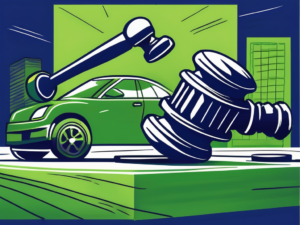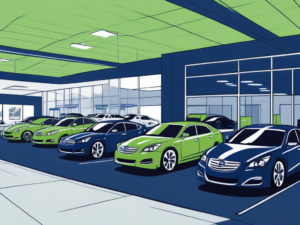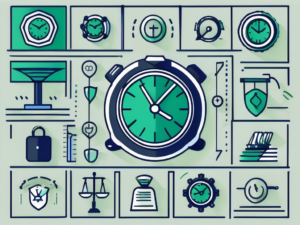Talk to Sales: (401) 200-6026

Car dealerships are constantly looking for ways to enhance efficiency, improve customer experience, and increase profitability. In today’s rapidly evolving digital landscape, automation presents a compelling solution. By automating key processes, car dealerships can streamline their operations, optimize resource allocation, and provide a seamless experience to their customers.
Understanding the Need for Automation in Car Dealerships
Car dealership operations have significantly evolved over the years. In the past, manual paperwork, tedious administrative tasks, and lengthy processes were the norm. However, with the advent of technology, there has been a paradigm shift in how dealerships operate.
Today, car dealerships are not just about selling cars; they are about providing a seamless and exceptional customer experience. Customers no longer have to spend hours browsing through brochures and visiting multiple dealerships in search of their dream car. Instead, they expect a personalized, efficient, and hassle-free buying experience.
The Evolution of Car Dealership Operations
Gone are the days when customers had to rely solely on brochures and sales representatives for information about the latest car models. With the rise of the internet and social media, customers now have access to a wealth of information at their fingertips. They can research different car models, compare prices, read customer reviews, and even schedule test drives online.
Furthermore, car dealerships have embraced automation in various aspects of their operations to meet the changing needs and expectations of customers. For instance, they have implemented digital platforms that allow customers to browse their inventory online, complete financing applications, and even schedule service appointments.
The Role of Technology in Modern Dealerships
Technology has revolutionized the way car dealerships function. One of the key technologies that dealerships have adopted is customer relationship management (CRM) software. This software enables dealerships to effectively manage their customer interactions, track leads, and provide personalized marketing campaigns.
Additionally, advanced inventory management systems have become an integral part of modern dealerships. These systems allow dealerships to efficiently track their inventory, manage vehicle pricing, and streamline the sales process. With real-time updates and automated notifications, dealerships can ensure that their inventory is always up-to-date and readily available for customers.
Moreover, automation has also extended to the service department of car dealerships. Service scheduling software enables customers to easily book appointments online, reducing wait times and improving overall customer satisfaction. Automated service reminders and notifications keep customers informed about upcoming maintenance and service needs, ensuring that their vehicles are well-maintained.
In conclusion, the need for automation in car dealerships is evident. By embracing technology and automation, dealerships can provide a seamless and exceptional customer experience, optimize their operations, and stay ahead in a highly competitive market. As technology continues to advance, it is crucial for car dealerships to adapt and leverage automation to meet the evolving needs and expectations of customers.
Sell cars on the lot faster with AutoRaptor
Know if we’re the right fit within 10 minutes
Key Areas of Automation in Car Dealerships
Automation can be applied to several areas within car dealerships, addressing pain points and improving efficiency across the board.
Car dealerships have embraced automation to streamline their operations and enhance customer experiences. By leveraging technology, dealerships can optimize various aspects of their business, from sales and customer relationship management to inventory management and control, as well as service and repair scheduling.
Sales and Customer Relationship Management
In the past, keeping track of leads, managing customer information, and monitoring sales performance were tedious and time-consuming tasks. With automation, dealerships can streamline these processes, consolidating customer data, and automating lead nurturing and follow-up activities. This enables sales teams to focus on building relationships and closing deals rather than getting bogged down by administrative tasks.
Automation tools in sales and customer relationship management also enable dealerships to personalize their interactions with customers. By analyzing customer data and preferences, automated systems can provide tailored recommendations and offers, enhancing the overall buying experience. Additionally, automated follow-up emails and reminders ensure that no potential customer slips through the cracks, increasing the chances of conversion.
Inventory Management and Control
Maintaining an accurate inventory is crucial for car dealerships. Automation tools can help streamline inventory management, enabling real-time tracking of vehicles, pricing, and availability. With automation, dealerships can efficiently manage their inventories, avoid stockouts, reduce holding costs, and provide customers with up-to-date and accurate information.
Automated inventory management systems utilize advanced algorithms to forecast demand, optimize stock levels, and suggest pricing strategies. By analyzing historical sales data, market trends, and customer preferences, these systems can make data-driven recommendations to dealerships, ensuring that they have the right vehicles in stock at the right time. This not only improves operational efficiency but also maximizes sales opportunities.
Service and Repair Scheduling
Servicing and repairs are integral parts of the car ownership experience. By automating service and repair scheduling, dealerships can simplify the process for customers while optimizing workshop utilization. Automated scheduling systems eliminate manual errors, provide customers with convenient online booking options, and ensure efficient allocation of resources, resulting in improved customer satisfaction and increased service revenue.
Automation in service and repair scheduling goes beyond just booking appointments. Advanced systems can integrate with diagnostic tools to automatically identify potential issues and recommend necessary repairs or maintenance. This proactive approach not only saves time but also enhances the overall customer experience by minimizing unexpected breakdowns and maximizing the lifespan of vehicles.
Furthermore, automated service reminders and notifications keep customers informed about upcoming maintenance requirements, ensuring that their vehicles are always in top condition. By providing a seamless and convenient service experience, dealerships can foster customer loyalty and generate repeat business.
Sell cars on the lot faster with AutoRaptor
Know if we’re the right fit within 10 minutes
Benefits of Implementing Automation in Car Dealerships
Implementing automation in car dealerships offers numerous benefits that drive operational efficiency and enhance the overall customer experience.
Enhanced Efficiency and Productivity
By automating repetitive and time-consuming tasks, car dealerships can significantly improve efficiency and productivity. Sales teams can focus on high-value activities such as lead conversion and customer engagement, while administrative tasks are seamlessly handled by automation systems.
Improved Customer Experience
Automation enables car dealerships to personalize the customer journey and deliver a seamless buying experience. By leveraging customer data, dealerships can provide targeted recommendations, tailored offers, and efficient after-sales service. This personalization not only enhances customer satisfaction but also builds trust and loyalty.
Cost Reduction and Profitability
Automating processes helps reduce costs associated with manual labor, paperwork, and potential errors. Additionally, by optimizing inventory management, dealerships can minimize holding costs and ensure faster turnover. These cost savings, paired with increased operational efficiency, contribute to improved profitability and a competitive edge in the market.
Challenges in Implementing Automation in Car Dealerships
While the benefits of automation in car dealerships are significant, there are challenges that need to be addressed when implementing automation.
Resistance to Change
Introducing automation may face resistance from employees who are accustomed to traditional processes. To overcome this, thorough training and effective change management strategies are essential. Clear communication and demonstrating the benefits of automation to employees can help alleviate resistance and foster a positive attitude towards change.
High Initial Investment
Implementing automation systems in car dealerships requires a significant upfront investment. This includes expenses associated with software integration, hardware upgrades, and employee training. However, it is important to note that the long-term benefits and cost savings gained from automation often outweigh the initial investment.
Training and Skill Development
Automation necessitates upskilling employees to effectively utilize the new technologies. Training programs should be implemented to ensure that employees have the necessary knowledge and skills to leverage automation tools. Investing in ongoing training and skill development ensures a smooth transition and maximizes the potential of automation within the dealership.
Conclusion
Automation is transforming the way car dealerships operate. By streamlining processes, enhancing efficiency, and improving the customer experience, automation is revolutionizing the car buying journey. While there are challenges to overcome, the benefits of automation in car dealerships far outweigh the costs. Embracing automation is not just a competitive advantage but an essential step towards staying relevant in the rapidly evolving automotive industry.
Want to improve your sales and move cars off the lot faster? Book a test drive with AutoRaptor to see how our simple dealership CRM software can help you close more deals effectively.
Subscribe to our Newsletter
Resources to help your dealership convert more leads into sales, retain more customers, and market inventory smarter, straight to your inbox every Sunday.




